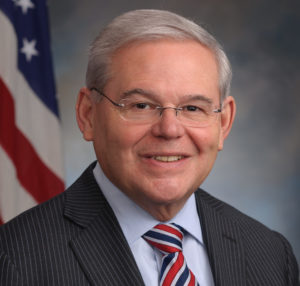WASHINGTON – U.S. Senate Foreign Relations Committee Chairman Bob Menendez (D-N.J.) and Senate Majority Leader Chuck Schumer (D-N.Y.) are calling on the Biden administration to further engage with Prime Minister Narendra Modi’s government over its treatment of farmers in India who have been peacefully demonstrating against the passage of new farming laws.
The months-long demonstrations have been met with orders from the central government and local authorities to shut off internet access in protest areas, cut off water and electricity supplies for the tens of thousands living in protest camps, and impede the work of journalists reporting on the protests.

“While we do not take a position on internal Indian policy matters, we recognize and condemn that on January 26, a small faction of protesters engaged in unacceptable violence at the Red Fort in New Delhi, but protest leaders quickly condemned the violence and the vast majority of protesters remained peaceful. However, Indian authorities at different levels of government have used that day’s events as a pretext to undertake a broader and sustained crack down on peaceful protesters, journalists, and government critics,” wrote the Senators to Secretary of State Antony Blinken. “India’s people and government will determine the path forward on these laws, and peaceful dialogue and respect for the viewpoints of all peaceful actors should drive that decision. As the U.S. pursues a more perfect union here at home, including efforts to bolster the rule of law and our democracy, those efforts reinforce the importance of addressing challenges to democracies abroad as well.”
A copy of the Senators’ letter can be found HERE and below.
Dear Secretary Blinken:
“India is a long-term strategic partner with deep ties to the United States thanks to our many shared values and our large and valued Indian American community. In light of these shared values and strong connections, we write with serious concern regarding the response of the Indian government to the farmer protests. We urge you to raise the importance of freedom of speech and the right to peaceful protest in conversations with your Indian counterparts and to ensure that State Department officials at all levels do so as well.
Following the passage of new farming laws last fall, farmers have engaged in over 100 days of peaceful demonstrations to express their opposition to certain policies. While we do not take a position on internal Indian policy matters, we recognize and condemn that on January 26, a small faction of protesters engaged in unacceptable violence at the Red Fort in New Delhi, but protest leaders quickly condemned the violence and the vast majority of protesters remained peaceful. However, Indian authorities at different levels of government have used that day’s events as a pretext to undertake a broader and sustained crack down on peaceful protesters, journalists, and government critics.
The New York Times has reported that in attempting to end the protests, Indian authorities have shut off Internet access in protest areas and in some instances cut off water and electricity supplies to thousands living in protest camps. We are alarmed by the sedition charges against a leading opposition politician and a 22-year-old climate activist related to the protests. The central government has repeatedly ordered Twitter to shut down accounts that relate to or report on the protests, including those of media organizations and journalists, and threatened to arrest Indian Twitter employees if Twitter fails to comply, as reported by CNN.
At the same time, Indian authorities have also sought to hinder the work of journalists reporting on the protests. Indian authorities have filed criminal complaints against at least 10 journalists for their reporting on the protests, including charges of sedition. Reporters without Borders said the accusations represent “a headlong assault on press freedom,” and Indian press freedom groups have characterized them as an intimidation tactic to stifle the media.
India’s people and government will determine the path forward on these laws, and peaceful dialogue and respect for the viewpoints of all peaceful actors should drive that decision. As the U.S. pursues a more perfect union here at home, including efforts to bolster the rule of law and our democracy, those efforts reinforce the importance of addressing challenges to democracies abroad as well. President Biden said during his February 4 speech at State Department that “we must start with diplomacy rooted in America’s most cherished democratic values: defending freedom, championing opportunity, upholding universal rights, respecting the rule of law, and treating every person with dignity.” It is in that spirit that we urge you to raise this issue in future engagements with the Indian government.”















